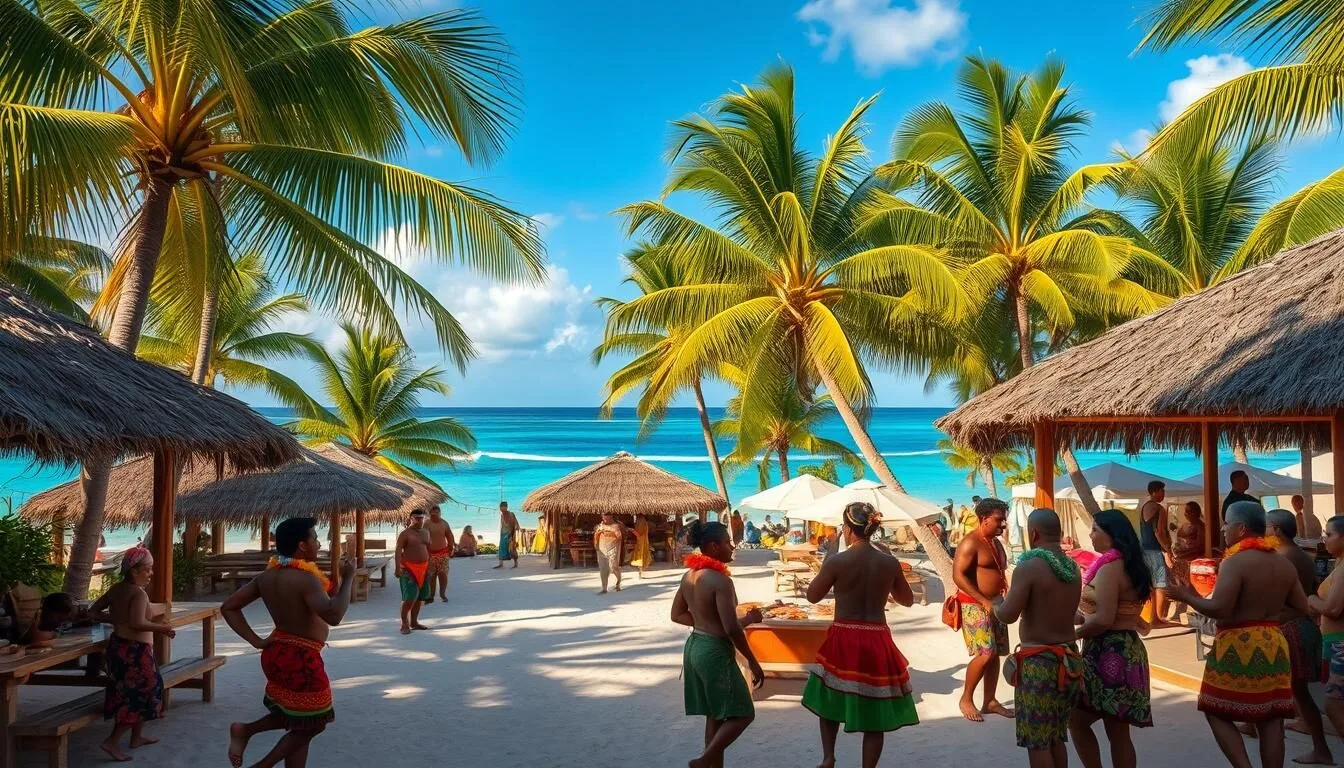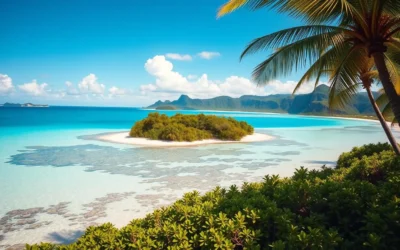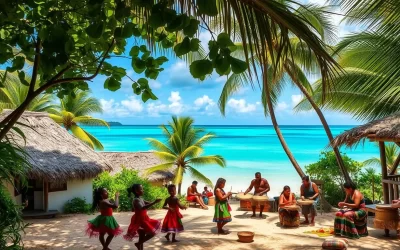✓ Accommodations ✓ Flights ✓ Rental Cars
Imagine a place where time stands still, and the rhythm of life is dictated by the ocean’s waves. Tuvalu, a small island nation in the Pacific, is one of the least visited countries on Earth, making it a perfect destination for travelers seeking unspoiled beauty and authentic cultural experiences.
As you plan your travel to this island paradise, you’ll have the opportunity to immerse yourself in the rich culture of the Tuvaluan people. The country’s unique culture and traditions are showcased through various festivals throughout the year, offering a glimpse into the heart and soul of this Pacific country.
You’re about to embark on a journey to one of the world’s most remote and authentic cultural experiences. With its crystal-clear lagoons, colorful sea life, and warm hospitality, Tuvalu is a true gem waiting to be discovered.
Discovering Tuvalu’s Island Paradise
With its rich Polynesian heritage, Tuvalu is a paradise for those seeking to explore authentic island life and vibrant cultural festivals. As you immerse yourself in this Pacific island culture, you’ll discover the unique traditions that have been preserved through generations.
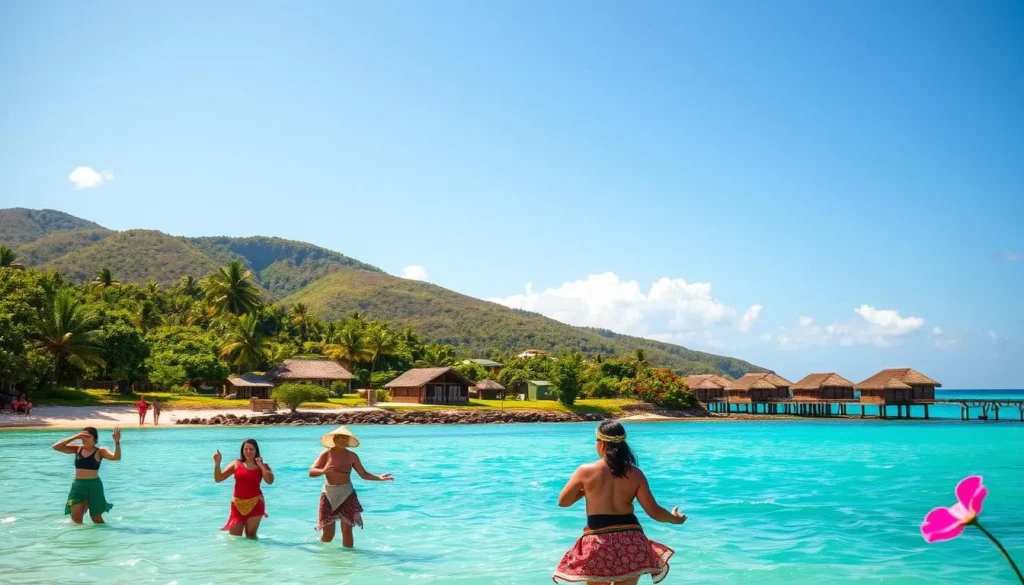
A Brief Introduction to Tuvalu
Tuvalu’s culture is deeply rooted in Polynesian values that emphasize community, family, and respect. Although Western influences have had an impact, the island’s distinct identity remains intact. Dancing, handcrafting, and music play vital roles in the daily life of locals. The Tuvaluan language, along with English, is widely spoken, and learning simple phrases like “Talofa” (hello) is a great way to show respect to the people.
The Cultural Significance of Festivals in Tuvalu
Festivals in Tuvalu are more than just celebrations; they are vital expressions of cultural identity. They help preserve traditions passed down through generations. Tuvaluan festivals blend ancient Polynesian customs with colonial history influences, creating unique celebrations. The Tuvaluan language is prominently featured in festival songs and chants, offering a chance to experience this melodic Pacific language in its most expressive forms.
For the Tuvaluan people, festivals strengthen community bonds and pass cultural knowledge to younger generations. When you participate, you’re witnessing living traditions that have adapted to modern times while maintaining their cultural essence.
Tuvalu Day: The National Celebration
Tuvalu’s National Day is a unique opportunity to immerse yourself in the local culture and traditions. As you travel to Tuvalu, you’ll experience the island’s vibrant celebrations firsthand.
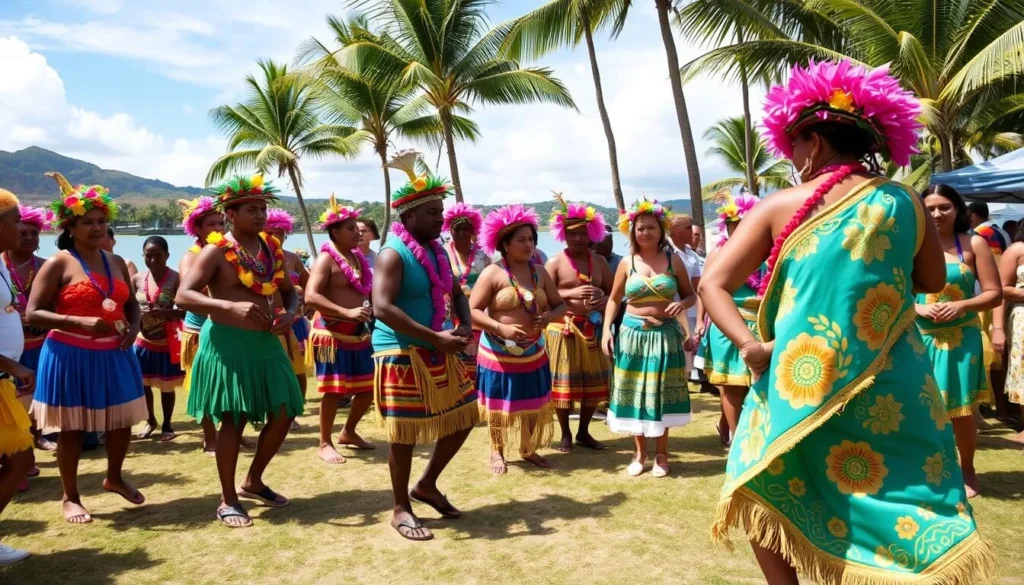
History and Significance
Tuvalu Day commemorates the country’s independence and cultural identity. The people of Tuvalu take great pride in their heritage, showcasing it through various ceremonies and events. The island’s history and mythology are woven into the fabric of the celebrations, making it a fascinating experience for visitors.
The significance of Tuvalu Day lies in its ability to bring together the community, promoting unity and cultural preservation. As you participate in the festivities, you’ll gain a deeper understanding of the island’s traditions and values.
What to Expect During Celebrations
During Tuvalu Day, you can expect a range of exciting activities and events. The festivities typically begin with official ceremonies, followed by community gatherings where people from all nine islands come together. You’ll witness spectacular traditional dance performances that tell stories of Tuvaluan history and daily life through rhythmic movements and expressive gestures.
- Vibrant parades featuring colorful traditional costumes that showcase the island’s artistic heritage.
- Community feasts offering you a chance to taste authentic Tuvaluan cuisine in a festive setting.
- Sports competitions, particularly volleyball and football tournaments, creating an atmosphere of friendly rivalry.
To make the most of your visit, consider staying at local accommodations and engaging with the community. You can also visit various places of cultural significance, such as the Maneapa, where traditional ceremonies are performed throughout the year.
Traditional Dance Ceremonies at the Maneapa
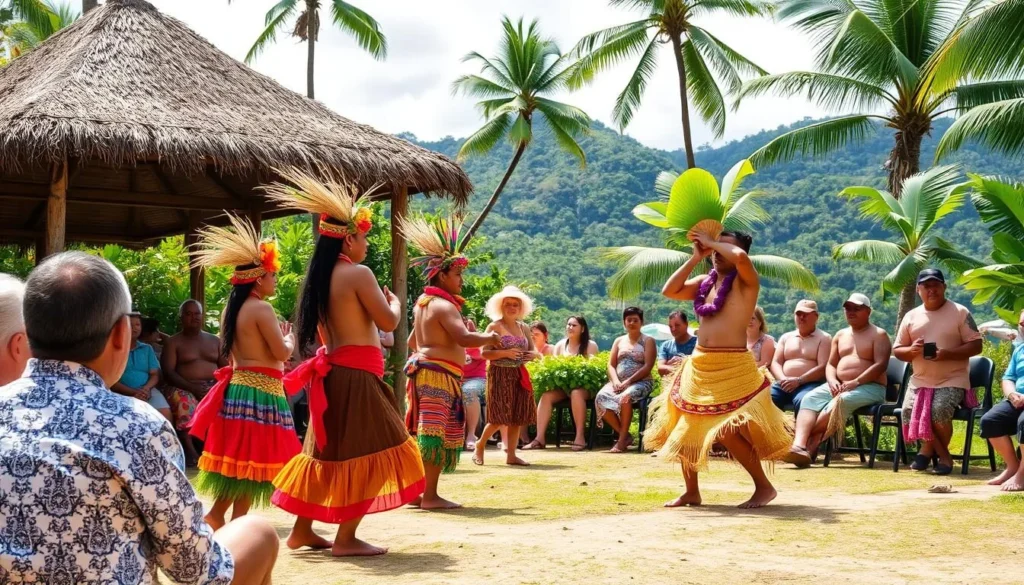
Traditional dance ceremonies at the Maneapa offer a glimpse into Tuvalu’s rich cultural traditions. When you travel to Tuvalu, you’ll have the opportunity to experience these vibrant cultural events firsthand.
Cultural Significance of Maneapa Gatherings
The Maneapa is more than just a venue; it’s the cultural heart of Tuvalu, where communities gather to celebrate significant events through dance and music. These gatherings are crucial for preserving Tuvalu’s cultural heritage and passing it down to younger generations.
Types of Traditional Dances to Experience
Tuvalu is home to a variety of traditional dances, each with its unique characteristics. Some of the dances you might encounter include:
- The fatele, a rhythmic performance featuring seated drummers and dancers creating increasingly intense beats and movements.
- The fakanau, a solemn dance that tells historical stories through precise hand gestures and body movements.
- The fakaseasea, a graceful women’s dance characterized by elegant arm movements that mimic the gentle waves surrounding the island.
- The fakataupati, or slap dance, showcasing the athletic abilities of male performers who create percussion through synchronized body slapping.
To witness these authentic cultural expressions, consult with your hotel staff or local guides, who can direct you to the best places to experience these dances during your trip to Tuvalu, a unique world experience.
Bomb Day: A Unique Historical Commemoration
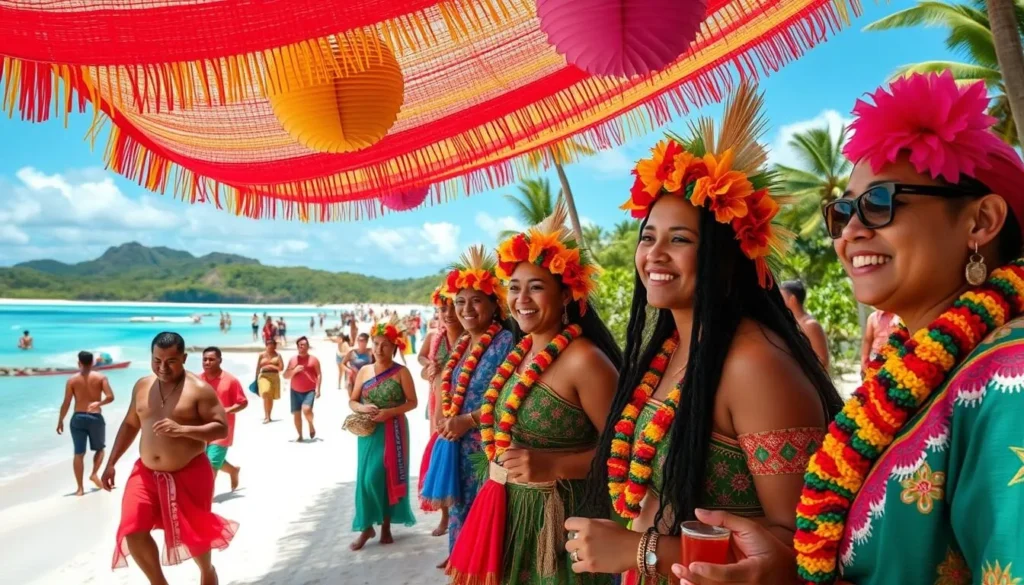
Bomb Day in Tuvalu is a unique historical commemoration that offers a glimpse into the island’s resilience during World War II. As you travel to Tuvalu for Bomb Day, you’ll experience a blend of solemn commemoration and celebratory activities that honor both the historical significance and the island’s resilience.
The Historical Background of Bomb Day
The historical significance of Bomb Day is rooted in Tuvalu’s experience during World War II. The day commemorates the impact of the war on the island’s life and place in the world. Remnants of the war are still visible in various parts of Tuvalu, including old runways and plane wrecks on Nanumea and Nukufetau.
Modern Celebrations and Activities
During your trip to Tuvalu, you can participate in guided tours to historical sites, including war debris along Fongafale. Community feasts follow the formal ceremonies, offering you a chance to engage with locals who share family stories about this pivotal time in Tuvaluan history. The evening celebrations feature traditional performances that symbolically transform historical hardship into cultural strength.
Cyclone Day: Remembrance and Resilience
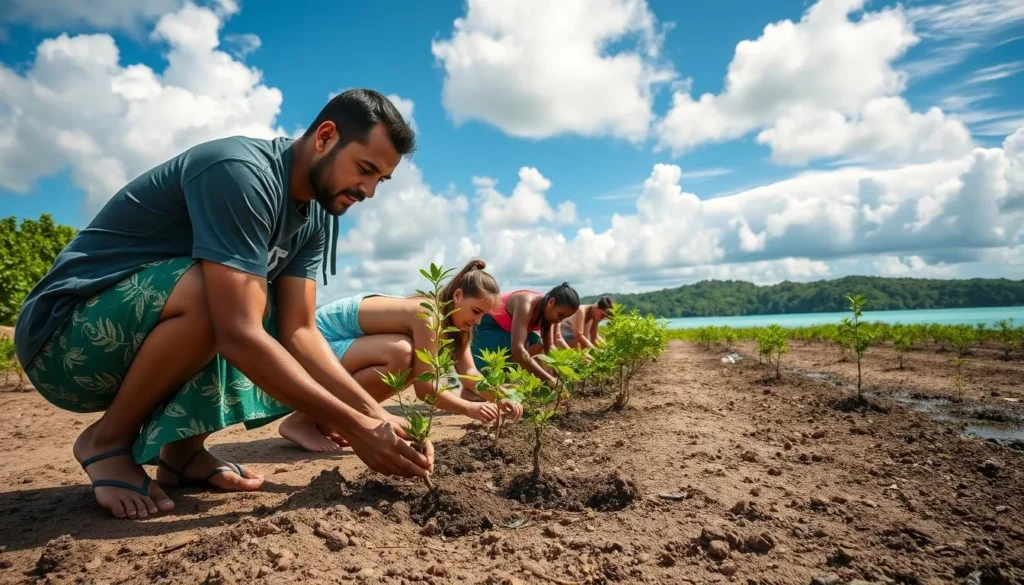
On October 21, Tuvalu commemorates Cyclone Day, a significant event that highlights the island’s resilience in the face of severe weather events. This day is crucial for understanding the impact of climate change on the island and its community.
The Origin of Cyclone Day
Cyclone Day originated from a historical event that had a profound impact on Tuvalu. The day serves as a reminder of the island’s vulnerability to cyclones and the importance of preparedness and resilience.
Community Activities and Significance
During Cyclone Day, the community comes together to participate in various activities focused on environmental conservation and climate change awareness. Some of the key activities include:
- When you travel to Tuvalu during Cyclone Day, you’ll witness community-wide activities focused on environmental conservation and climate change awareness, including mangrove planting ceremonies.
- Educational programs are central to the day’s events, with schools and community groups sharing knowledge about traditional weather prediction methods alongside modern climate science.
- The festivities include resilience demonstrations where elders teach younger generations traditional building techniques and food preservation methods that have helped sustain life through severe weather events.
- Community art projects often feature prominently, with installations made from recycled materials that symbolize both the threat to Tuvalu and the creative adaptations islanders are making.
- By participating in these events, you’ll gain insight into how climate impacts are not just environmental concerns but deeply integrated aspects of contemporary Tuvaluan cultural life and identity.
The Mangrove planting project in Nanumea atoll is a notable example of Tuvalu’s conservation efforts. The project involves the establishment of a two-acre lagoon-based mangrove nursery/reserve and the planting of 1,000 mangrove seedlings along a one-kilometer coastline for 10 years. Additionally, the Tuvalu Association of Non-Government Organizations (TANGO) has proposed an expansion project to replant mangroves and seedlings of Beauty Leaf Laurel in areas threatened by coastal erosion.
New Year’s Celebrations: Tuvaluan Style
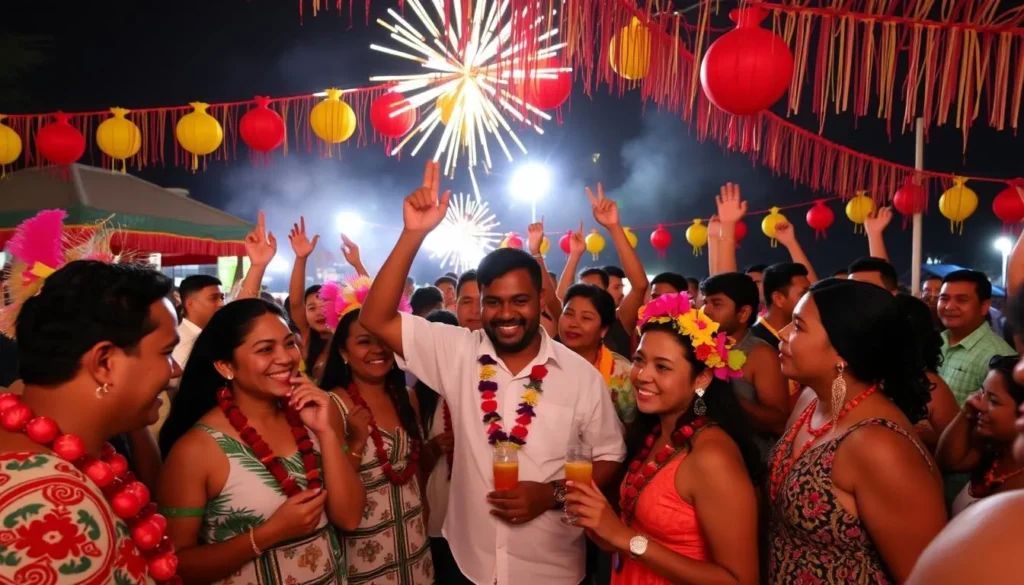
Ringing in the New Year in Tuvalu is a memorable experience like no other. The island nation offers a unique blend of traditional and modern festivities that are sure to leave a lasting impression on your travel memories.
Unique Island Traditions for New Year
Tuvalu’s New Year’s celebrations are deeply rooted in its island traditions. You can experience the rich cultural heritage through the various festivities, including traditional dances and music performances. The Tuvalu Women’s Handicraft Center near the airport transforms into a festive marketplace, offering a chance to purchase meaningful souvenirs.
Where to Join the Festivities
You can join the New Year’s celebrations at various places across the island. The main community maneapa in Funafuti is a great spot, and your hotel can arrange transportation and provide guidance on participation. For a more intimate experience during your trip, consider visiting the “Matagigali” bar near the airstrip, which hosts special New Year’s Eve events.
Other options include church services across all islands, which welcome visitors, and the waterfront areas in Funafuti, which offer informal gatherings. Make sure to dress modestly for church services and arrive early to secure a good spot.
Tuvalu: Top Festivals to Check Out When Visiting Throughout the Year
Tuvalu is a hidden gem for festival enthusiasts, offering a unique cultural experience throughout the year. As you plan your trip to this island nation, you’ll find that its festivals are a great way to immerse yourself in the local culture.
Best Times to Visit for Cultural Experiences
The best time to visit Tuvalu for cultural experiences is during its major festivals. You should plan your trip around these events to get the most out of your visit. For instance, Tuvalu Day is a significant celebration that showcases the nation’s history and culture.
To get to Tuvalu, you’ll need to fly into Funafuti International Airport (FUN). Flights are available from Nadi, Fiji, on Tuesday, Thursday, and Saturday with Fiji Airways, and from Tarawa, Kiribati, on Wednesdays with Air Kiribati. It’s essential to book your flights well in advance as seats are limited.
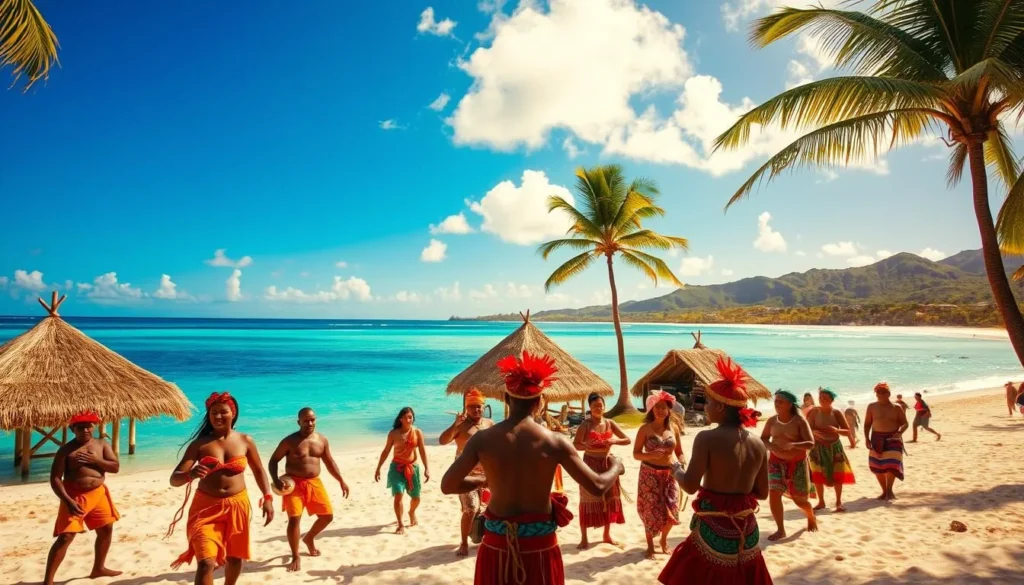
Planning Your Trip Around Festival Dates
When planning your visit, consider the costs involved. Budget approximately 350 AUD for one-way flights, and accommodation costs ranging from 60-200 AUD per night, depending on your choice of places to stay. Options include the Funafuti Lagoon Hotel, Filamona Lodge, and Esfam Hotel.
| Accommodation | Price per Night (AUD) | Amenities |
|---|---|---|
| Funafuti Lagoon Hotel | 200 | Lagoon views, air conditioning, restaurant |
| Filamona Lodge | 60 | Clean, basic rooms, private bathrooms |
| Esfam Hotel | 150 | Air-conditioned rooms, breakfast, Wi-Fi |
It’s also crucial to book your accommodation at least three months in advance, especially for major festivals like Tuvalu Day, as options fill up quickly. Be prepared for flexibility in your itinerary, as festival dates can occasionally shift.
Weekend Cultural Experiences: Nightlife and Music
Experience the unique cultural rhythm of Tuvalu during its weekend gatherings. Tuvalu’s nightlife is not just about entertainment; it’s a celebration of its rich cultural heritage. You can visit two nightclubs on the island that operate on weekends, offering a glimpse into the local dance and music scene.
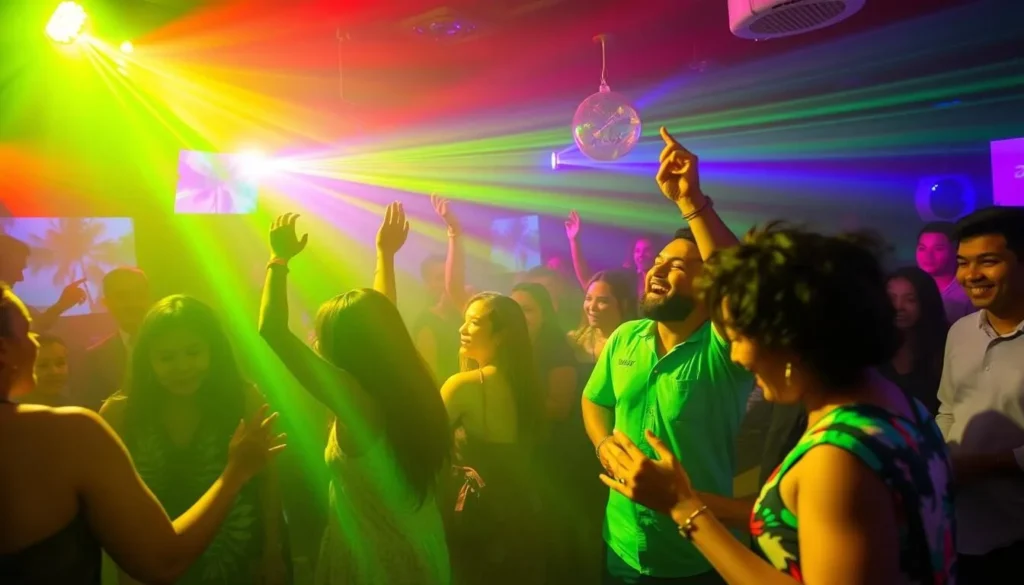
Matagigali Bar: Island Rhythms and Dance
The “Matagigali” bar near the airstrip is a popular spot to enjoy island rhythms and dance. It’s a great place to experience the local culture.
Tefota: Experiencing Local Music Scene
“Tefota” is another venue where you can experience authentic Tuvaluan music. The performances are in the Tuvaluan language, offering a unique travel experience. The venue operates with minimal services but maximum cultural authenticity, making it a standout in the world.
- Enjoy authentic Tuvaluan music performed primarily by locals.
- Weekend performances often feature collaborations between established and younger musicians.
- Respect local customs by dressing modestly and being open to participation.
Practical Tips for Festival Visitors
Tuvalu’s festivals are a unique experience, and being prepared is key to enjoying them fully. As you prepare for your visit, understanding the cultural nuances and practical aspects will enhance your experience.
Cultural Etiquette at Tuvaluan Festivals
When attending Tuvaluan festivals, it’s essential to respect local customs. Dress modestly and be mindful of your behavior during ceremonies. Bringing small gifts from your home country can be a thoughtful gesture, appreciated by your hosts or new friends.
What to Wear and Bring
Pack lightweight, breathable clothing suitable for the tropical climate. Don’t forget essentials like sunscreen, a hat, and insect repellent. Since ATMs are unavailable, bring sufficient Australian Dollars (AUD) in cash. A waterproof bag is also recommended for boat transportation. Consider bringing a universal power adapter for charging your devices.
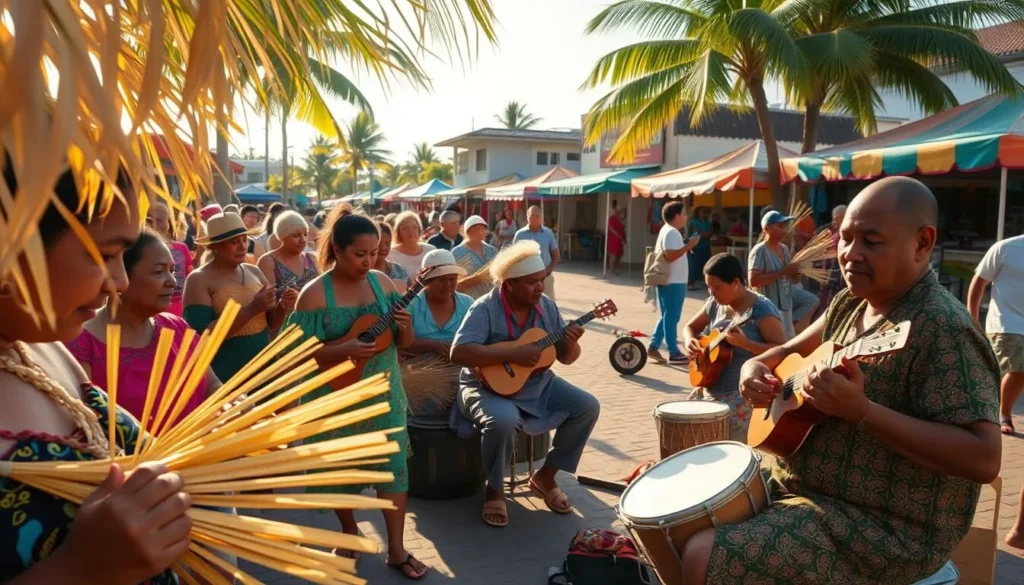
Conclusion
Visiting Tuvalu during its festivals is an experience that will stay with you forever, a memory of the island’s warmth and resilience. As you travel to Tuvalu, you’re not just witnessing cultural events, but becoming part of a living tradition that has sustained these islands for generations.
The festivals of this small country offer windows into Tuvaluan resilience, creativity, and community spirit. From the national pride of Tuvalu Day to the historical remembrance of Bomb Day, each celebration reveals different facets of how Tuvaluans relate to their past, present, and uncertain future.
As you return home from your journey across the sea, the rhythms of fatele dances and the warmth of community gatherings will remain with you. Whether you traveled between islands by boat or focused on the main celebrations in Funafuti, your presence as a respectful visitor helps support the continuation of these cultural traditions.
Tuvalu isn’t just a place to visit; it’s a feeling that stays with you long after you leave. So, plan ahead, respect local customs, and slow down to island time to find magic in every moment here.
The above is subject to change.
Check back often to TRAVEL.COM for the latest travel tips and deals.
